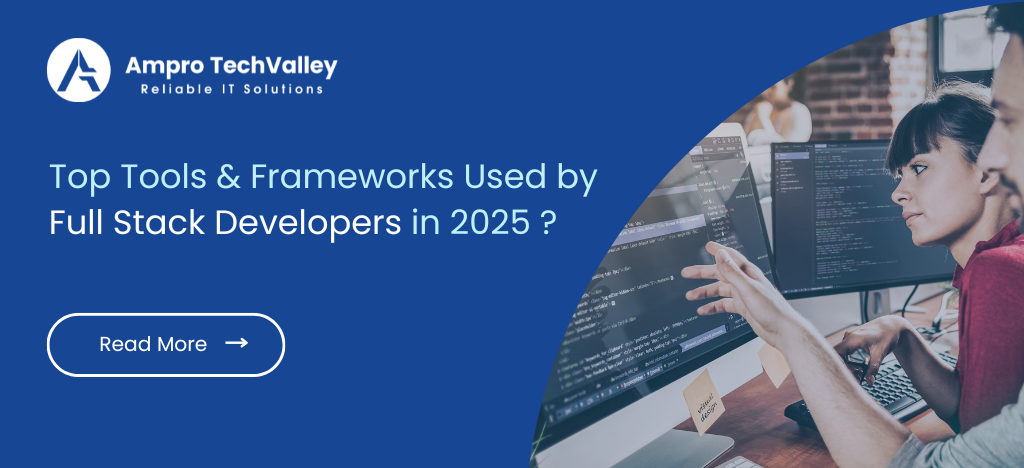Introduction:
Full stack development has evolved rapidly, and 2025 brings an exciting mix of tools and frameworks that simplify coding, improve scalability, and accelerate project delivery. For students, job seekers, and career changers in Namakkal, understanding these technologies is no longer optional-it’s the difference between being employable and being in demand. That’s why exploring the top tools and frameworks used by full stack developers in 2025 is essential if you’re planning to enroll in a Full Stack Development Course in Namakkal or upgrade your technical expertise.
What are the Top Tools and Frameworks Used by Full Stack Developers
Full stack developers work across both the front end (user interface) and the back end (server logic, databases, APIs). Tools and frameworks not only save time but also ensure consistency, security, and scalability.
For example, frameworks like React or Angular help build smooth, responsive user interfaces, while Node.js and Django simplify server-side programming. In 2025, the industry is leaning heavily toward frameworks that integrate AI-powered automation, real-time collaboration tools, and cloud-native environments.
Front-End Frameworks Leading in 2025
1. React.js
Still the most popular choice for developers, React dominates in 2025 because of its flexibility and strong ecosystem. Its reusable components and huge community support make it ideal for both startups and large enterprises.
2. Angular
Angular remains a strong contender for enterprise-level projects. With TypeScript at its core, it’s well-suited for scalable, complex applications.
3. Vue.js
Loved for its simplicity and fast learning curve, Vue continues to be the go-to for small to medium projects. By 2025, its adoption has grown in Asia and among solo developers working on freelance projects.
Back-End Frameworks Powering Developers
1. Node.js
Node.js is a staple for real-time applications like chat systems and streaming services. Its non-blocking I/O model allows developers to handle thousands of connections simultaneously – something businesses in e-commerce and fintech demand in 2025.
2. Django
This Python-based framework remains a favorite for projects where security and rapid development matter. With AI-driven integrations becoming common, Django’s “batteries-included” philosophy makes it future-proof.
3. Spring Boot
Java may be decades old, but Spring Boot continues to dominate in banking, healthcare, and enterprise-level applications where robustness is non-negotiable.
Database Tools Every Developer Must Know
1. MongoDB
A flexible, document-oriented database that fits perfectly with JavaScript-based stacks like MERN. In 2025, it’s widely used for handling unstructured data in AI and IoT applications.
2. PostgreSQL
Known for its reliability and strong support for advanced queries, PostgreSQL has grown as the go-to database for data-driven projects.
3. Firebase
For startups and students, Firebase is the easiest way to integrate real-time databases, authentication, and cloud hosting-all without heavy server maintenance.
DevOps & Cloud Tools Developers Rely On
1. Docker
Containerization is now standard practice. Docker allows developers to package applications with their dependencies, ensuring they run anywhere without errors.
2. Kubernetes
Managing containers at scale is where Kubernetes shines. In 2025, even mid-level companies in Namakkal are adopting Kubernetes for microservice-based applications.
3. GitHub Copilot & AI Tools
AI-driven code assistants have become an integral part of development. GitHub Copilot, for example, boosts productivity by suggesting entire code blocks, allowing developers to focus on problem-solving rather than boilerplate coding.
Full Stack Development Trends in 2025
-
AI-Enhanced Development: Tools are integrating machine learning for predictive coding and bug detection.
-
Serverless Architectures: AWS Lambda and Azure Functions are reducing infrastructure costs.
-
Progressive Web Apps (PWAs): Blending web and mobile app experiences into a single platform.
-
Low-Code/No-Code Tools: Supporting faster prototyping while still requiring developers for complex projects.
If you’re aiming to master these technologies, a Full Stack Development Course in Namakkal provides hands-on exposure, industry projects, and mentorship that self-learning alone can’t match. It’s the fastest path to building a career-ready portfolio.
How These Tools Benefit Students in Namakkal
For students, freelancers, and career changers in Namakkal, these tools are not just buzzwords-they’re your ticket to global opportunities. Many local companies are adopting modern stacks like MERN (MongoDB, Express, React, Node), and knowing them can make you a top candidate for internships and jobs.
Understanding the top tools & frameworks used by full stack developers in 2025 ensures that you’re aligned with industry demand, whether your goal is employment, freelancing, or launching your own startup.
FAQ
1. Which full stack framework is best for beginners in 2025?
React (front end) and Node.js (back end) are ideal starting points. Together, they form the MERN stack, which is highly in demand.
2. Do I need to learn all the tools mentioned?
Not immediately. Focus on one stack (e.g., MERN or Django + React) and expand as your confidence grows.
3. Can I build a career locally in Namakkal with these skills?
Yes. Many IT firms and startups in Namakkal are looking for developers skilled in modern frameworks, and remote work opportunities are also abundant.
4. How long does it take to become a full stack developer?
On average, 6–12 months of focused learning, especially if you join a structured training program, is enough to build job-ready skills.
5. Is coding the only skill needed for full stack development?
No. Problem-solving, teamwork, and understanding business needs are equally important alongside coding expertise.
Conclusion
As we’ve seen, the top tools & frameworks used by full stack developers in 2025 cover front-end technologies like React, back-end frameworks like Django and Node.js, and essential tools like Docker, Kubernetes, and MongoDB. These aren’t just trends-they’re the backbone of modern application development.
For those serious about entering the tech industry, enrolling in a Full Stack Development Course in Namakkal with guidance from Ampro TechValley offers the perfect opportunity to gain hands-on expertise and stand out in a competitive job market.
Along with Namakkal, we offer online and offline Full Stack Development Course in Salem, Tirupur, Coimbatore, Chennai, Trichy, and Thanjavur. Choose the location that’s most convenient for you.



